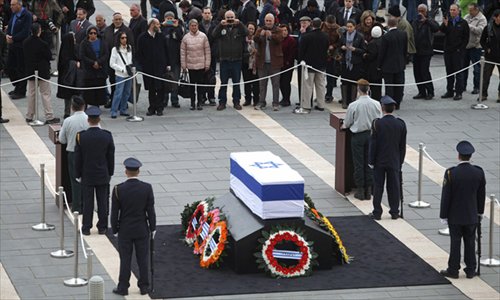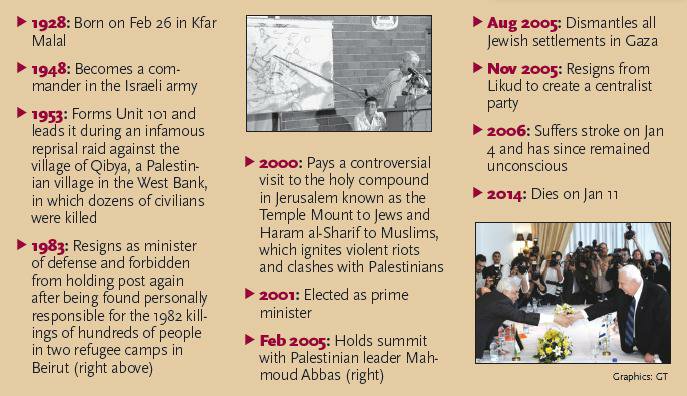Sharon ‘last of Middle East strongmen’

People take pictures as they walk past the coffin of former Israeli prime minister Ariel Sharon during a national memorial ceremony at the Knesset in Jerusalem on Sunday. Photo: CFP

The death of former Israeli prime minister Ariel Sharon, the divisive statesman who stunned the Arab world with his dramatic turnaround, marked the end of an era of strongman politics in the Middle East, analysts say.
Sharon died aged 85 on Saturday at Sheba Medical Center, near Tel Aviv, where he had been in a coma since suffering a stroke at the pinnacle of his power as prime minister in January 2006. His condition declined steeply since the middle of last week.
"The last leader," wrote a commentator in the left-leaning Haaretz newspaper, noting that the political vacuum created by his collapse eight years ago "has never really been filled and it is doubtful that it will be filled in the foreseeable future."
"Strongmen prevail in the Middle East, but future generations will unlikely surpass him as most leaders are less adventurous and decisive in comparison," Ma Xiaolin, a Beijing-based Middle East expert, told the Global Times.
Ma noted that the spread of religious extremism in the Middle East over recent decades has added to the region's uncertainty and led politicians to act hesitantly on whether to make concessions and unlikely to think on a long-term basis.
However, Yin Gang, a research fellow with the Institute of West Asian and African Studies at the Chinese Academy of Social Sciences, told the Global Times that even though the era of strongman politics is over, the region always needs and calls for politics led by strong statesman to solve the conflicts between politics and religion, and there is still a possibility for the emergence of another strongman.
Ahead of his funeral on Monday, Sharon's coffin was laid in the plaza outside the Knesset, Israel's parliament, for the public to pay their last respects.
Earlier Sunday, ministers held a minute's silence in memory of Israel's 11th prime minister as they met for the weekly cabinet meeting, an official statement said.
Sharon left historic footprints in the Middle East through military invasion and Jewish settlement but also with the shock decision to withdraw from the Gaza Strip.
"Bulldozer in war and peace," said the English-language Jerusalem Post, describing him as "perhaps the most revered and often reviled of the country's politicians, perceived alternately as a peacemaker and a warmonger."
The Palestinians were quick to welcome news of his death, which prompted an outburst of celebration in the Gaza Strip, where the ruling Islamist Hamas movement said it was a "historic moment" marking the "disappearance of a criminal whose hands were covered with Palestinian blood."
"Sharon did whatever was necessary to ensure the security of Israel and that's his pragmatism. All his decisions were made based on this condition rather than making peace with Palestine," Yin Gang said, noting that his decision to withdraw from the Gaza Strip was made as he thought it of benefit to Israel.
The US and other powers mourned Sharon as a peacemaker, noting his late pursuit of dialogue with the Palestinians.
Those negotiations continue under Israeli Prime Minister Benjamin Netanyahu, though differences remain vast.
Agencies contributed to this story